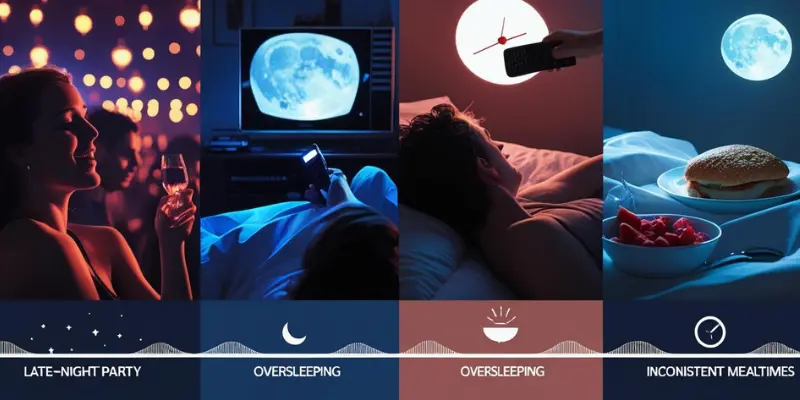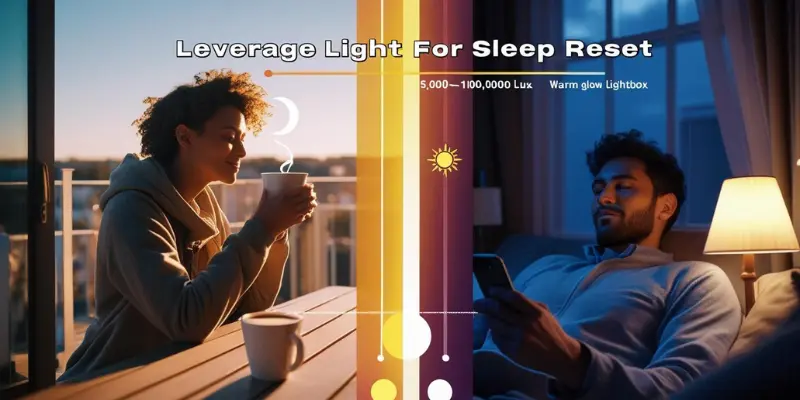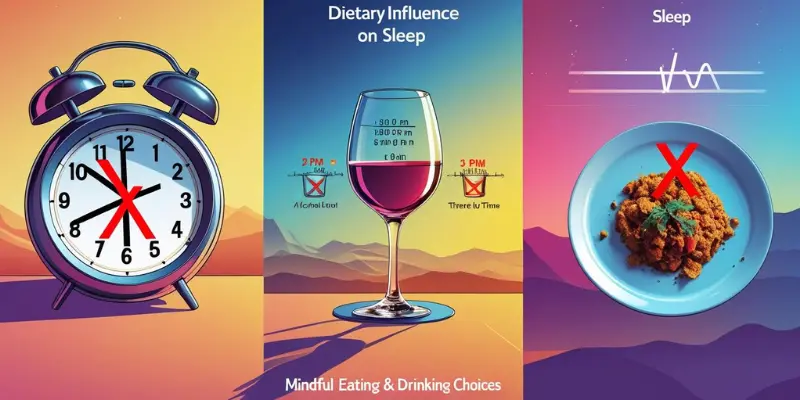Beat the Weekend Sleep Cycle Blues: Simple Strategies for Consistent Rest & Improved Mood
Published: 19/07/2025
We’ve all been there—the weekend arrives, and with it, the temptation to stay up late, sleep in, and throw our usual routines out the window. You know what happens next: the best intentions for rest often disappear the moment the weekend hits. As a result, come Monday morning, you’re left groggy, grumpy, and dreading the start of the workweek more than usual. Sound familiar? The frustrating cycle of inconsistent sleep on weekends, followed by a rough Monday morning, is something many of us struggle with. You’re not alone.
Whether it’s those extra hours of binge-watching or meeting friends late into the night, the weekend can easily derail your sleep schedule. You’ve probably noticed how that irregular sleep pattern affects your mood, energy, and focus once the workweek kicks in.
This phenomenon has a name: social jet lag. It occurs when your sleep schedule shifts significantly between weekdays and weekends, throwing off your body’s internal clock (also known as the circadian rhythm). Just like jet lag after a long flight, social jet lag can leave you feeling disoriented, fatigued, and out of sync with your natural rhythm. What feels like a “catch-up” weekend sleep plan might actually be doing more harm than good.
You may have noticed it yourself: after a late-night Friday and a long sleep-in on Saturday, Sunday evening rolls around, and you’re still struggling to feel rested. Your body isn’t accustomed to the sudden changes, and the results are far from rejuvenating. So, how do we break this cycle and reclaim better weekend sleep?
In this guide, we’re not going to ask you to follow rigid sleep rules or sacrifice your weekend fun. Instead, we’ll walk you through simple, actionable strategies grounded in self-care and personal development that can help you achieve consistent rest. The goal is to create a sleep schedule that doesn’t leave you feeling exhausted or anxious by Monday morning.
By applying these practical techniques, you’ll not only break free from the weekend sleep cycle blues but also improve your mood, energy levels, and overall productivity throughout the entire week. You have the power to take control of your weekend sleep—and in turn, transform how you feel every single day. Let’s dive in!
Understanding the Weekend Sleep Shift: Why Your “Catch-Up” Plan Backfires
Let’s take a closer look at the root cause of why your weekend sleep habits might be backfiring—social jet lag. In simple terms, social jet lag is the misalignment between your biological clock (circadian rhythm) and your social clock (the schedule society expects you to follow). During the week, most of us wake up at a set time, work, eat, and sleep according to the demands of our job, school, or daily responsibilities. But when the weekend rolls around, that predictable routine tends to go out the window.
This shift in your sleep schedule—staying up later and sleeping in longer than usual—messes with your body’s natural rhythms. Your biological clock gets confused, much like it would if you flew across multiple time zones in one weekend. The result? You feel groggy, out of sync, and exhausted, even though you technically “caught up” on sleep.
Common Causes of Social Jet Lag: The Weekend Temptations
While it may seem harmless to stay up a little later or sleep in on the weekends, there are several common weekend habits that can cause significant disruption to your sleep patterns:
- Late Nights Out: Whether it’s social gatherings, parties, or just watching one more episode, staying up late can significantly shift your internal clock. The inconsistency in sleep times, rather than the number of hours, is what really throws off your rhythm.
- Binge-Watching: It’s easy to fall into the trap of watching multiple episodes or movies in a row. However, the blue light from screens and the delayed bedtime can interfere with the production of melatonin, the hormone that helps you sleep.
- Sleeping In Excessively: Catching up on sleep by snoozing until noon may sound like a remedy, but it only exacerbates the problem. Sleeping in too long disrupts your circadian rhythm, leaving you feeling more disoriented and sluggish.
- Inconsistent Mealtimes: Another overlooked factor is eating at irregular times. Our bodies rely on consistent meal patterns to maintain internal balance. When we skip meals, eat too late, or eat large meals at irregular hours, it can disrupt sleep and add to feelings of grogginess.

Expert Insight: Why Wake-Up Times Matter More Than Late Nights
Through years of tracking sleep patterns and working with clients, I’ve found that the biggest culprit in disrupting our circadian rhythm isn’t necessarily staying up late, but rather the inconsistency of wake-up times. When you shift your wake-up time by several hours on the weekend, it confuses your body’s natural internal clock.
For example, if you wake up at 6 AM during the week and then sleep in until 10 AM on the weekend, you’re essentially resetting your body’s internal schedule—adding jet lag to your life. This inconsistency not only messes with your sleep quality but also impacts your mood, energy, and overall productivity.
Real-World Example: The Weekend Jet Lag
Think of it like this: Imagine flying from New York to California every Friday night and back every Sunday morning. That’s a 3-hour time difference, and each time you make the trip, your body needs time to adjust. That’s how our bodies feel when we jump between different sleep times on the weekend. Just like jet lag, your body becomes confused, and it takes several days to recalibrate, leading to tiredness, irritability, and difficulty focusing.
The Hidden Costs: Beyond Just Feeling Tired
It’s easy to dismiss the effects of weekend sleep disruptions as just being “a little tired” on Monday, but the truth is, the consequences go far beyond grogginess. Here’s how inconsistent sleep on weekends impacts other areas of your life:
- Mood Impact: Have you ever noticed how a disrupted sleep schedule can make you irritable, anxious, or moody? That’s because a lack of proper rest messes with your emotional regulation. Sleep deprivation can increase stress hormones and lower serotonin, the “feel-good” hormone, making you more prone to mood swings and feelings of irritability.
- Energy & Focus: Inconsistent sleep reduces your energy levels, leaving you drained throughout the workweek. You may find it harder to concentrate, be productive, and stay engaged. Whether you’re working or simply trying to stay active, your focus and energy will likely take a hit, affecting both your personal and professional life.
- Self-Care Barrier: When you’re sleep-deprived, your motivation for self-care tends to drop significantly. Healthy eating habits, exercise, and personal development goals become secondary to simply trying to get through the day. This cycle can also make you feel even more disconnected from your long-term wellness goals, creating a barrier to self-improvement.

Anecdote: The “Catch-Up” Fallacy
I used to think that getting an extra three hours of sleep on Saturday morning would “fix” the sleep deficit I accumulated during the workweek. But I quickly realized this was an illusion. Instead of feeling refreshed, I noticed that by Monday, my creativity had plummeted, my energy was low, and by Wednesday, my patience was paper-thin. The inconsistency of my weekend sleep schedule made it nearly impossible to recover, and I felt worse by the end of the week.
So, while it’s tempting to think that sleeping in will “catch up” on your missed sleep, it’s the inconsistency in sleep patterns that truly derails your rhythm. It’s time to rethink how we approach weekend rest and start prioritizing consistency over the idea of “catching up.”
Simple Strategies to Anchor Your Weekend Sleep for a Brighter Week
This section is all about providing you with the practical, actionable steps you need to anchor your weekend sleep routine in a way that promotes consistency, better mood, and energy levels throughout the entire week. These strategies are designed to be simple, flexible, and rooted in self-care, allowing you to reclaim control of your sleep without feeling restricted.
Strategy 1: The “One-Hour Rule” for Flexible Consistency
One of the most effective strategies to combat social jet lag is the One-Hour Rule. The concept is simple: limit the deviation between your weekday and weekend sleep schedules to no more than one hour. This helps minimize disruption to your circadian rhythm, which thrives on consistency.
If you typically wake up at 6 AM on weekdays, aim to wake up no later than 7 AM on weekends. This slight shift is enough to give you the flexibility to enjoy your weekend while keeping your body’s internal clock in sync.
How to Implement:
- Step 1: Determine your usual weekday wake-up time. For example, if you wake up at 6 AM on weekdays, your weekend wake-up time should be no later than 7 AM.
- Step 2: Set an alarm for both your bedtime and wake-up time on weekends, even if it’s just to nudge you in the right direction. Keeping your sleep schedule within a consistent window makes it easier for your body to adjust, even during the weekend.
- Step 3: Stick to this schedule for a couple of weekends in a row. While the extra flexibility might feel strange at first, you’ll soon notice how much more refreshed and energized you feel come Monday morning.
Why It Works :
By maintaining a relatively consistent sleep-wake schedule (with a max deviation of one hour), you minimize circadian rhythm disruption. This approach keeps your body’s internal clock aligned, reducing the chances of feeling disoriented or sluggish after the weekend. Plus, this method is grounded in both sleep science and real-world experience.
Actionable Tip:
To stay on track, consider setting a “sleep reminder” on your phone. This gentle nudge can help you stick to your bedtime and wake-up time, even when you’re tempted to stay up late.
Strategy 2: Leverage Light for Circadian Rhythm Reset
Your circadian rhythm is highly responsive to light exposure, and one of the best ways to keep your body’s internal clock on track is by getting bright, natural light exposure as soon as possible after waking up. This helps reset your body’s clock for the day, regardless of whether it’s a weekday or weekend.
Actionable Steps:
- Get outside for at least 15-30 minutes each morning. Whether it’s a walk, enjoying your morning coffee on the balcony, or simply standing by a window, the bright morning light helps synchronize your body’s internal clock.
- If outdoor light is unavailable, consider using a lightbox with a color temperature of around 5,000–10,000 lux, which mimics natural sunlight.
Evening Light Management:
In addition to morning light, it’s equally important to manage evening light exposure. Bright light late at night—especially from screens—can trick your brain into thinking it’s still daytime, making it harder to fall asleep.
Actionable Steps:
- Limit blue light exposure at least 60-90 minutes before bedtime. Turn off electronics, use blue-light-blocking glasses, or switch your phone to “night mode” to reduce blue light.
- Dim your home lights in the evening. Consider using low-wattage lamps or setting the dimmer on your overhead lights. This sends a signal to your brain that it’s time to wind down and promotes melatonin production, which helps you fall asleep.

Expert Insight:
“Beyond just turning off screens, consciously dimming your home lights in the evening is a strategy I often recommend. It’s a simple yet effective method that significantly supports melatonin production and your natural sleep cycle. Trust me, it’s the little changes like this that make a big difference.”
Strategy 3: Crafting a Weekend Wind-Down Ritual
Winding down before bed isn’t just for weekdays. In fact, weekends can be even more stimulating, especially with social events, late nights, and screen time. A calming wind-down ritual will signal to your body that it’s time to relax and prepare for a restful night.
Actionable Steps:
- Start 60 minutes before your consistent bedtime by engaging in relaxing activities that help signal your body it’s time to sleep.
- Try activities like:
- Warm bath: Helps relax muscles and lower your body temperature, which is ideal for sleep.
- Reading a physical book: A non-stimulating activity that can help wind your mind down.
- Gentle stretching/yoga: Releases tension and helps your body relax.
- Listening to calming music: Soothing sounds can aid in the transition from wakefulness to sleep.
- Light journaling: Write down your thoughts or things you’re grateful for—this reduces stress and clears your mind.
Specialist Tip:
“Avoid emotionally charged discussions, work tasks, or binge-watching intense shows in the hour before bed. Your brain needs calm, not chaos. Engaging with high-stress activities will keep your brain on alert, making it harder to fall asleep and feel rested.”
Strategy 4: Mindful Eating & Drinking Choices
Your diet and drinking habits play a major role in your sleep quality. Be mindful of what you consume, especially in the hours leading up to your weekend bedtime.
- Caffeine: Avoid caffeine after 2 PM. While it may give you a temporary energy boost, caffeine interferes with your ability to fall into a deep sleep.
- Alcohol: Although alcohol may make you feel sleepy initially, it disrupts your deeper sleep stages. Try to stop drinking at least 3 hours before bed to allow your body time to process the alcohol and prevent disruptions in your sleep cycle.
Heavy Meals:
Eating large, spicy, or very fatty meals close to bedtime can also disturb your sleep. These foods can lead to indigestion, acid reflux, or discomfort, making it harder to relax and fall asleep.
Actionable Tip:
“If you enjoy a drink, try to finish it at least three hours before your consistent weekend bedtime. This gives your body time to process it, allowing you to enter a deeper, more restful sleep without the negative effects of alcohol.”

By applying these simple strategies, you’ll be able to anchor your weekend sleep in a way that doesn’t leave you groggy or disoriented. Small adjustments to your routine—whether it’s sticking to a one-hour wake-up rule, managing light exposure, or creating a relaxing bedtime ritual—will make a noticeable difference in how you feel come Monday morning. You deserve to feel refreshed, focused, and energized, no matter what day it is!
Expert Tips for Lasting Weekend Sleep Consistency & Avoiding Common Traps
Achieving lasting weekend sleep consistency is about more than simply sticking to a bedtime. It involves addressing the unique challenges and pitfalls that often derail our best efforts to stay on track. In this section, I’ll provide expert insights and practical solutions to help you navigate the common traps and sustain your consistent weekend sleep routine for long-term success.
The “Catch-Up Sleep” Fallacy & Smarter Napping
We’ve all been there—after a week of insufficient sleep, we think that a long Saturday or Sunday morning lie-in will fix the sleep deficit. It seems logical, right? But here’s the thing: long weekend sleep-ins and marathon naps don’t actually “catch up” on sleep debt and can make things worse.
When you sleep in excessively, your body doesn’t get the same restorative benefits as a normal night’s sleep. In fact, long naps or irregular sleep patterns can further disrupt your circadian rhythm and mess with the timing of your sleep cycle. This inconsistent schedule can throw off your sleep quality throughout the week, leaving you feeling groggy and disoriented.
Actionable Alternative:
Instead of attempting to “catch up” on sleep with a long lie-in or nap, try a short, strategic power nap if you’re feeling especially drained. A nap of 20-30 minutes, taken before 3 PM, can give you a quick energy boost without interfering with your nighttime sleep.
Key Benefits of Power Naps:
- Boosts alertness without grogginess.
- Keeps your circadian rhythm stable by avoiding long disruptions.
- Enhances creativity, focus, and productivity.
“I used to think an all-day Sunday nap would fix my sleep deficit. I’d sleep until noon, hoping to make up for the previous week’s sleepless nights. But this only led to insomnia Sunday night and a worse Monday morning. Now, if I need a boost, I take a quick 20-minute power nap in the early afternoon. It’s enough to refresh me without ruining my nighttime sleep, and I wake up feeling much more rested and focused.“
Navigating Social Pressures & Late-Night Temptations
Let’s face it—weekends often come with social events, late-night gatherings, and fun activities that can easily disrupt your sleep schedule. You might feel pressured to stay out later or socialize more, even though it conflicts with your sleep goals. But here’s a reminder: prioritizing your sleep is a form of self-respect and self-care. You don’t have to sacrifice your rest just to keep up with social norms.
- Schedule earlier social events: Consider shifting your weekend dinner parties, gatherings, or movie nights to earlier times, like 5 PM or 6 PM, to leave room for a more relaxed evening.
- Communicate your sleep goals: Let your friends and family know that you’re prioritizing better sleep for your well-being. Most people will respect your decision and even support you in creating a healthier sleep routine.
- Set boundaries: If late-night plans aren’t a good fit for your sleep schedule, don’t hesitate to politely leave early or decline the invitation. Remember, it’s okay to say no if it protects your health.
Empowering Mindset:
“Your sleep is non-negotiable. It’s easy to think that missing a few hours here and there won’t matter, but the truth is, even small shifts in your sleep routine can impact your overall well-being. Setting boundaries around your sleep shows that you respect your body’s needs. It’s okay to miss out on a late-night event for the sake of your health and productivity.”
Real-World Example:
“One client of mine was constantly staying up late for weekend dinner parties. After discussing their sleep goals, they decided to shift their dinner parties to 6 PM, allowing everyone to enjoy the evening without sacrificing their bedtime. Not only did they feel better rested, but their friends also appreciated the earlier, more relaxed evening.“
The “Bedroom as Weekend Entertainment Hub” Trap
One of the most common mistakes people make is treating their bedroom as a multi-purpose space—one that’s not just for sleep. Whether it’s binge-watching TV shows, scrolling through social media, or even eating, bringing these activities into the bedroom creates confusion for your brain. Your body starts associating your bed with everything except rest, which disrupts your ability to wind down properly.
The key to improving sleep quality is to keep your bedroom a sanctuary that’s solely reserved for sleep and intimacy. By creating this separation, your brain will start associating the bed with relaxation and rest, rather than activity or stress.
Actionable Tip:
If you find yourself lounging in bed all day on Sunday—watching movies or scrolling through your phone—make a conscious effort to move to another room for your leisure activities. This will help strengthen the mental association between your bed and sleep, ensuring your bedroom remains a space for rest.
By incorporating these expert tips into your weekend routine, you’ll be well on your way to creating a consistent sleep schedule that sets you up for a better week. From smarter napping and social boundaries to avoiding bedroom distractions, these strategies will help you stay on track with your sleep goals while navigating the unique challenges weekends bring. Consistency is key, and with a few tweaks, you can experience lasting improvements in both your mood and energy levels.
Conclusion: Embrace Consistent Sleep, Embrace a Better You
As we’ve explored, creating a consistent weekend sleep routine isn’t about following rigid rules or sacrificing fun—it’s about making simple, mindful changes that respect your body’s natural rhythm. By applying just a few of these strategies, you can break free from the weekend sleep cycle blues and feel better, more energized, and more focused all week long.
Even small adjustments, like the One-Hour Rule or managing light exposure, can make a profound impact on your mood, energy, and overall well-being. When you prioritize consistency, you’re not just improving your sleep—you’re investing in a better, more vibrant version of yourself.
Final Benefits:
By embracing a more consistent weekend sleep schedule, you’ll notice the positive effects ripple throughout your entire life:
- Improved Mood: Feel less irritable, anxious, or stressed, and enjoy a more balanced emotional state throughout the week.
- Consistent Energy: Experience sustained energy, making it easier to tackle both work tasks and personal activities without feeling drained by midweek.
- Sharper Focus: Benefit from better concentration and mental clarity, allowing you to be more productive and creative.
- A More Enjoyable Week: Start each week with a sense of renewal, knowing that your sleep has set you up for success, from Monday morning to Friday evening.
When your weekend sleep is consistent, your entire week follows suit, and you’re more likely to feel your best every single day.
Ready to transform your weekends and your entire week? Start implementing these simple, powerful strategies today. Whether it’s sticking to a consistent wake-up time or creating a relaxing wind-down routine, the changes you make today will impact how you feel tomorrow. Share your favorite tip, or let us know your biggest weekend sleep challenge, in the comments below – we’d love to hear from you!
Remember, prioritizing your sleep is a form of self-respect. By taking small steps to align your weekend sleep with your body’s natural rhythms, you’re investing in your long-term health, happiness, and productivity. Embrace these changes with confidence, knowing that the best version of yourself is within reach—starting with a good night’s sleep. You’ve got this!
Your Weekend Sleep Questions: Answered & Demystified
Social jet lag occurs when your sleep schedule on weekends shifts significantly (typically by more than an hour) from your weekday routine. This mismatch confuses your body’s internal clock (circadian rhythm), making it harder to fall asleep and wake up naturally. For your mood on weekdays, this often translates into increased irritability, grogginess, reduced patience, heightened anxiety, and a general feeling of being “off” or less resilient to stress, similar to how you’d feel after traveling across time zones.
While a little extra sleep on the weekend can offer some temporary relief from fatigue, the idea of completely “catching up” on significant sleep debt is largely a myth. Long lie-ins (more than an hour past your usual wake time) actually disrupt your circadian rhythm further, making it harder to fall asleep Sunday night and worsening the “Monday blues.” It’s more effective to slightly extend sleep consistently or take strategic short naps than to drastically shift your schedule.
To minimize negative impacts on your mood and energy, aim to shift your bedtime and wake-up time by no more than one hour in either direction on weekends compared to your weekday routine. This small deviation is usually manageable for your circadian rhythm and helps maintain consistency, preventing the severe “social jet lag” effects.
You’ll likely notice several immediate benefits: significantly reduced “Monday blues,” more stable energy levels throughout the entire week, improved focus and concentration, less irritability, and a greater overall sense of emotional balance. Many people report feeling more productive and optimistic, even on typically stressful days.
This is a common challenge! Instead of saying “no” entirely, try to suggest earlier plans (e.g., brunch instead of late dinner, afternoon activities). If late plans are unavoidable, focus on minimizing the impact: stick to the “one-hour rule” for your wake-up time, limit alcohol, and begin your wind-down routine as soon as you get home. Communicate your sleep goals to understanding friends; they might even appreciate the earlier schedule!
Short, strategic naps (around 20-30 minutes) taken in the early to mid-afternoon can be incredibly helpful for boosting alertness and easing fatigue without disrupting your nighttime sleep. Avoid long naps (over 90 minutes) or napping too close to your consistent bedtime, as these can indeed make consistent sleep harder and deepen social jet lag.
Don’t panic! For Sunday, still try to wake up as close to your consistent wake time as possible (within the one-hour rule if you can). Get immediate bright light exposure. Avoid long naps. Focus on a very consistent and early bedtime on Sunday night, even if you don’t feel tired yet. Prioritize your wind-down routine to signal to your body that it’s time to transition back to the weekday rhythm. Consistency from Sunday onward is key.

- Be Respectful
- Stay Relevant
- Stay Positive
- True Feedback
- Encourage Discussion
- Avoid Spamming
- No Fake News
- Don't Copy-Paste
- No Personal Attacks

- Be Respectful
- Stay Relevant
- Stay Positive
- True Feedback
- Encourage Discussion
- Avoid Spamming
- No Fake News
- Don't Copy-Paste
- No Personal Attacks





